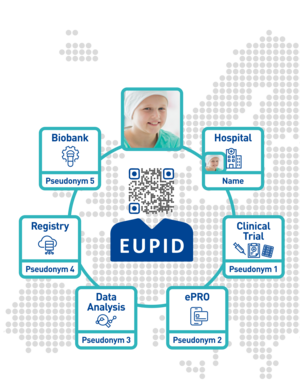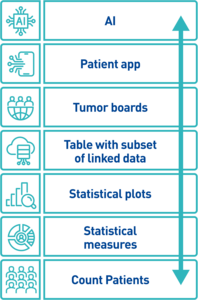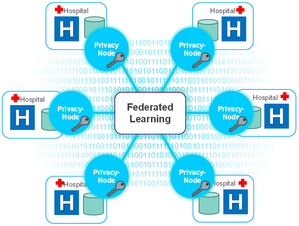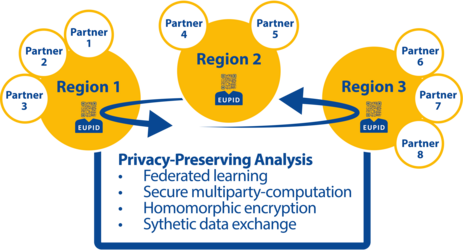Data are considered the new gold in healthcare. However, making use of the full potential of the existing data is related to various obstacles, mainly due to intellectual property, privacy, and legal issues. Therefore, new approaches are needed which support usage of distributed data without requiring to transfer huge amounts of sensitive data.
We are developing solutions which support privacy-preserving technologies. Depending on the respective scenario, different technologies are applied.
Privacy-Preserving Record Linkage
Privacy-Preserving Record Linkage (PPRL) concerns the linking of different datasets, without disclosing the participant’s identity. Our European Patient Identity (EUPID) Services have been designed to facilitate secondary use of datasets in biomedical research and healthcare by addressing the following major requirements:
- prevent duplicate registration of patients
- avoid creating a transparent universal patient ID
- provide distinct pseudonyms for patients in different contexts
- preserve the possibility for re-identification by a trusted third party
- keep a protected link between the different pseudonyms in the background
- support the creation of merged datasets for secondary use
The EUPID Services are currently used primarily in rare disease applications, including paediatric oncology infrastructures. Additionally, they are a core component of the virtual platform, connecting rare disease research across Europe, as currently developed in the European Joint Programme.
Privacy-Preserving Record Linkage (PPRL) is required in various application scenarios, from simply counting patients without duplicates in federated data sources up to AI applications. An overview of PPRL use cases in the field of paediatric oncology was recently published in Cancers Use Cases Requiring Privacy-Preserving Record Linkage in Paediatric Oncology - PMC.
Federated Learning
Federated learning has gained a great momentum since 2016 based an algorithm developed by Google AI researchers, where deep learning networks could be trained on multiple end-users' smart phones. We have applied these algorithms in the health care setting and developed algorithms which can handle huge datasets from different healthcare providers, without the need to pool these sensible datasets in a central data pool.
Privacy-Preserving Research Infrastructures
We are developing infrastructures which enable different types of privacy-preserving AI, including PPRL and federated learning. Additionally, together with our partners, we are also investigating other privacy-preserving technologies, including Secure Multi-Party Computation (SMPC), synthetic data generation, homomorphic encryption, etc.
Selected Projects
| Project | Our contribution | |
| Paediatric Oncology Projects | In the course of various research projects in the field of paediatric oncology, we provide an infrastructure for Privacy-Preserving Record Linkage for distributed data sources. The projects include clinical trials (Low and Intermediate risk Neuroblastoma, High risk neurobalstoma, very high risk neuroblastoma, Opsoclonus Myoclonus Syndrome) and registries (SIOPEN Bioportal, SUPA Bioregistry). | |
| PRIMAGE | As a sub-contractor of the consortium, we are providing solutions for data management and privacy-preserving record linkage to the PRIMAGE project, which explores AI solutions based on clinical, biological and image related data for paediatric cancer research. | H2020, grant agreement No. 826494.
|
| PanCareSurPass | We are developing a Survivorship Passport for paediatric cancer survivors in Austria, which links data from different sources in research and routine care in a privacy-preserving way. The solution will be linked to the Austrian Electronic Health Record (EHR) ELGA. | H2020: "Implementation research for scaling up and transfer of innovative solutions involving digital tools for people-centred care" contract 11021892 |
| European Joint Programme on Rare Diseases | Within the EJP RD, we explore methods for Privacy-Preserving Record Linkage (PPRL) based on our EUPID Services, describe use cases for PPRL and explore methods for interoperability of different PPRL solutions | "European Commission - DG Research and Innovation" contact 11019651
|
| D4Health Tirol | We have integrated our solution for Privacy-Preserving Record Linkage (PPRL) in an infrastructure that takes use of distributed data from hospitals, telehealth services and Austria's death register, supporting machine learning and AI in research and routine care. | |
| CBmed | Starting several years ago in the research project CBmed, together with a local hospital provider, we are currently exploring methods for federated learning based on distributed electronic medical records for prediction of clinical events such as delirium. | COMET - K1-Zentren 3. Ausschreibung |
| LBI for Digital Health and Prevention | We are developing privacy-preserving technologies which support behavioural change in terms of physical activity. |






